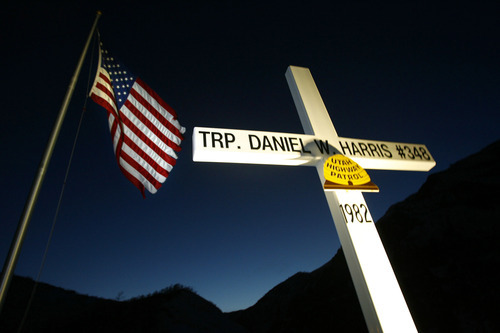This is an archived article that was published on sltrib.com in 2011, and information in the article may be outdated. It is provided only for personal research purposes and may not be reprinted.
For the fourth time, U.S. Supreme Court justices on Friday met to discuss whether they will hear a contentious case involving the appropriateness of placing 12-foot-high crosses on public property in Utah to memorialize state troopers killed in the line of duty.
Supreme Court justices have met three times already to debate whether to take the case and are expected to announce their decision next week, said Brian Barnard, a Salt Lake City civil rights attorney involved in the case.
"It is most interesting that this initial decision is taking so long and these repeated considerations by the justices," Barnard said. In order for the high court to take the case, four of nine justices must agree, he said.
The length of time it is taking justices to decide whether to hear arguments in the case is an issue that has garnered headlines across the legal community in recent weeks.
In an entry on a U.S. Supreme Court blog at http://www.scotusblog.com, American University law professor and American Bar Association chair-elect Stephen Wermeil wrote that the delay likely indicates justices are struggling to agree on whether they want to tackle the issues addressed in the highway crosses case.
"Sometimes, it seems, a case may confound the Supreme Court: should it grant certiorari to hear oral argument and decide the question presented by the case, should it deny review even though the case presents important questions, should it rule summarily, without hearing oral arguments, or should it instead hold the case for a related one?" Wermeil wrote.
"Whether the Utah cross appeals become a vehicle for the court to clarify when religious displays may be part of government expression will become apparent when the Justices finally decide what to do with the two petitions. Will they decide that the crosses are not government speech but private expression? Will they decide that the crosses are government speech but cannot reasonably be seen as endorsing religion? Will they decide that the crosses do send a message of government support for Christianity, as the 10th Circuit ruled? Or will they decide that there may be other, better cases in which to clarify these issues? The next word will come from the court."
The justices' decision is one the Utah Attorney General's Office and Barnard are anxiously awaiting on opposing sides.
Utah Attorney General Mark Shurtleff has pushed the high court to take on the case, arguing that the highway crosses should be displayed.
"With two simple lines the highway crosses remind us of the ultimate sacrifice made by troopers while trying to protect us," Shurtleff has said. "Before now, no other court has ever held that memorial crosses establish a religion. The crosses only establish a trooper died in the line of duty."
Barnard, meanwhile, represents the organization against placing crosses on public land. Barnard, who filed a brief on behalf of American Atheists Inc., argues the case is not worthy of the high court's attention, claiming issue of roadside crosses on state land doesn't apply outside of the Beehive State.
"There are no similar [publicly funded] memorial cross programs in other states. This decision is not going to have ramifications beyond Utah," Barnard said of his request. "While of concern to the Utah Highway Patrol Association, the case is not the kind of case nor of such national interest, that the U.S. Supreme Court would normally get involved in."
The filings earlier this year by Barnard and Shurtleff were the latest arguments in what has been a lengthy court battle over the alleged display of religious imagery on public land between the Utah Highway Patrol Association (UHPA) and American Atheists Inc.
In January, a federal appeals court in Denver delayed an order demanding the UHP remove crosses placed along the state's highways to commemorate troopers killed in the line of duty. The 90-day stay, approved recently by the 10th Circuit Court of Appeals, allowed attorneys for the association and UHP to try to appeal their case to the nation's highest court.
Former Texas Solicitor General Ted Cruz will represent the A.G.'s Office and attorney Byron Babione of the Alliance Defense Fund in Arizona will represent UHPA if the high court takes up the case. Babione will try to persuade the Supreme Court that the crosses don't establish a religion because "the passive memorials coerce no one to do anything."
The case began when American Atheists and three of its Utah members sued the state in 2005 for allowing the association to incorporate the UHP logo on the 12-foot-high crosses and place some of them on public property.
Fourteen crosses sit alongside state highways or on the lawn outside a UHP office.
The trooper's name, rank and badge number are printed on a 6-foot crossbar, and a large depiction of the UHP's beehive symbol hangs below where the two bars meet. The first cross was erected in 1998 on private property and 13 others were added later, most of them on public property. The memorials are privately funded and owned by the UHPA, while the state owns the public land on which some of them sit.
"My clients believe that the Highway Patrol troopers should be honored for their sacrifice," Barnard has said. "They can be and should be honored with memorials that do not emphasize religion and do not emphasize one religion to the exclusion of all others."
The 10th Circuit Court of Appeals ruling in January to allow the stay followed a 5-4 December decision by the same court to deny a request to hear the case from the UHPA.
The UHPA had wanted the court to reverse an earlier ruling that the crosses are unconstitutional.
Twitter: @mrogers_trib



